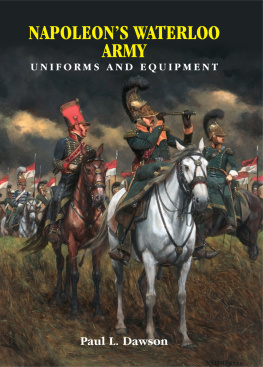This edition is published by PICKLE PARTNERS PUBLISHINGwww.pp-publishing.com
To join our mailing list for new titles or for issues with our bookspicklepublishing@gmail.com
Or on Facebook
Text originally published in 1845 under the same title.
Pickle Partners Publishing 2016, all rights reserved. No part of this publication may be reproduced, stored in a retrieval system or transmitted by any means, electrical, mechanical or otherwise without the written permission of the copyright holder.
Publishers Note
Although in most cases we have retained the Authors original spelling and grammar to authentically reproduce the work of the Author and the original intent of such material, some additional notes and clarifications have been added for the modern readers benefit.
We have also made every effort to include all maps and illustrations of the original edition the limitations of formatting do not allow of including larger maps, we will upload as many of these maps as possible.
RECOLLECTIONS OF MILITARY SERVICE
IN
1813, 1814, & 1815,
THROUGH
GERMANY, HOLLAND, AND FRANCE;
INCLUDING SOME DETAILS OF THE BATTLES OF QUATRE BRAS AND WATERLOO
BY THOMAS MORRIS,
LATE SERGEANT OF THE 2 ND BATTALION
OF THE 73 RD REGIMENT OF FOOT
A NEW EDITION
PREFACE
In the various histories which have been published recording the events of the late war, the greatest praise has invariably been given to those regiments whose officers were of high birth and aristocratic connexions; while other corps, not possessing these fortuitous advantages, have had the mortification to find their services pass altogether unnoticed. This cannot be imputed as a fault to the historian, as he derived his information from the official despatches: the onus, then, must rest with the General commanding, and without ascribing to him any corrupt motive, we may consider it to have been but natural for him to make the most honourable mention of those regiments whose officers he was desirous of recommending to the special notice of headquarters. However, favouritism always has existed, and doubtless always will. I shall endeavour, therefore, in the following pages, simply to place on record some of the exploits of the regiment in which I served, as well as of some others with whom we occasionally co-operated; but who, like ourselves, had not the honour to be noticed in public despatches, for the reasons I have before stated.
As I have no written data to go by, but trust entirely to memory, should any inaccuracies be discovered, I hope it will be imputed to that circumstance, rather than to any wilful intention on my part to record events which I do not know or believe to be true.
TO THE NEW EDITION.
The first edition of this work was published in January last, and copies forwarded to the metropolitan Journals and Magazines,and the reviews in general were satisfactory,some indeed very complimentary. There was, however, one exception. The United Service Gazette of the 22 nd of February last, after taking some six weeks to consider its verdict, produced a most elaborate critique, concocted with great care and labour, and evidently intended to put the extinguisher on my humble work,professing to regret that I had no friend discreet enough to advise me to burn it But as those among my acquaintance who have done me the honour to read the book have been pleased to express their approbation of it, and, moreover, as it is well-known that the United Service Gazette was established, and is supported, by the very class of persons against whom some of my strictures were intended to apply, I had no hopes of being patronised by them; but certainly I did not expect the before the surgeon, in the presence of seventy or eighty of their comrades. I have witnessed many such cases of caprice and tyranny, and have often regretted there was no society in existence to take cognizance of them. I am aware, however, that such society would be deemed illegal, and in all probability the attorney-general would be instructed to prosecute the parties composing it. We may form a society for the prevention of cruelty to animals, and associations are allowed to exist for the protection of various classes and interests; but we must not combine to throw the shield of protection over our brethren in the army and navy. If, however, the parties themselves have the courage and ability to lay a statement of their case before the public, there will always be found means of assisting them; and, just to show the practicability of the thing, I will cite a case which occurred some years since at Plymouth, and the facts having been submitted to the Board of Admiralty, and afterwards to the House of Commons, there can be no doubt of their accuracy.
In the year 1813, a man-of-war was lying at Plymouth, the captain of which was continually flogging his men for the most trifling fault, and to prevent the report of his cruelty reaching headquarters, an order was issued that no man should write to the Board without submitting the letter to the captains inspection. One man, who had been some time on board, and had conducted himself well, was desirous of obtaining his discharge, and got his messmate to write for him to the Admiralty on the subject; and when the letter was answered, the captain was made acquainted with the fact, and summoning the man before him, he charged him with a breach of discipline. The actual writer of the letter being included in the charge, pleaded that he had considered the order for submitting correspondence to the captains inspection applied only to such letters as contained charges against the officers or the discipline on board; but the letter he had written did not contain any imputation, but simply a request for a discharge for reasons therein stated. This excuse, however, did not avail them; they were both placed under arrest, and some additional duty was imposed on them by way of punishment.
The next day being Sunday, the crew were assembled for divine service, and the chaplain (who had the credit of being what all chaplains in the army and navy are not) was very sincere in the performance of his sacred duties, and among other matters urged on his hearers the practice of brotherly love, forgiveness of injuries, &c. Now there was one man present on whom the reverend gentlemans discourse made some impression: it was he who had been placed under arrest for writing his shipmates letter, and after the service he wrote a note to the captain, alluding to the impressive discourse they had heard, and in the most respectful manner begging his honour would forgive him the crime he had unintentionally committed. The following morning all hands were summoned on deck; and the captain calling for Barton, asked him if that note was written by him? On his replying in the affirmative, the captain ordered him to be lashed to a gun and flogged. The punishment was immediately inflicted, and continued until the poor fellow fainted, when the surgeon ordered his release.
On his recovery, Barton wrote an account of the transaction to his friends, who in their answer stated that his flogging was considered most unjustifiable and illegal, and he was urged to apply to a certain gentleman for advice: he did so. The solicitor came alongside, forwarded his card to the captain, and explaining the object of his visit, he was refused admittance. Application was then made to the Board of Admiralty, who immediately sent down an order to Captain Groves to allow the solicitor to have access to the man whenever he thought proper, either on board or on shore, and that without the presence of a third party.









